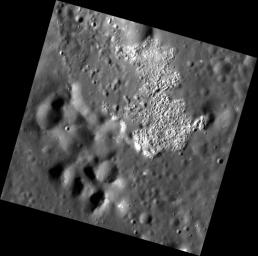
|
An Unnamed Wonder
- Click the image above for a larger view
- Full-Res JPEG (1284 x 1272) (140.2 kB)
- Full-Res TIFF (1284 x 1272) (1.6 MB)
Caption:
The image above shows an area within an unnamed basin that has been etched by hollows. This is the only area within the basin in which hollows are found. To the bottom left, part of the peak ring of the basin can be seen. This peak ring has been modified by subsequent impacts.
This image was acquired as a high-resolution targeted observation. Targeted observations are images of a small area on Mercury's surface at resolutions much higher than the 200-meter/pixel morphology base map. It is not possible to cover all of Mercury's surface at this high resolution, but typically several areas of high scientific interest are imaged in this mode each week.
Date acquired:
February 13, 2013
Image Mission Elapsed Time (MET):
3038823
Image ID:
3509823
Instrument:
Narrow Angle Camera (NAC) of the Mercury Dual Imaging System (MDIS)
Center Latitude:
43.52°
Center Longitude:
291.5° E
Resolution:
21 meters/pixel
Scale:
This image is ~23 km (14 mi.) across.
Incidence Angle:
74.2°
Emission Angle:
10.4°
Phase Angle:
63.8°
Background Info:
The MESSENGER spacecraft is the first ever to orbit the planet Mercury, and the spacecraft's seven scientific instruments and radio science investigation are unraveling the history and evolution of the Solar System's innermost planet. MESSENGER acquired over 150,000 images and extensive other data sets. MESSENGER is capable of continuing orbital operations until early 2015.
For information regarding the use of images, see the MESSENGER image use policy .
Cataloging Keywords:
| Name | Value | Additional Values |
|---|---|---|
| Target | Mercury | |
| System | ||
| Target Type | Planet | |
| Mission | MESSENGER | |
| Instrument Host | MESSENGER | |
| Host Type | Orbiter | |
| Instrument | Mercury Dual Imaging System (MDIS) | |
| Detector | Narrow Angle Camera (NAC) | |
| Extra Keywords | Grayscale, Impact, Map, Radio | |
| Acquisition Date | ||
| Release Date | 2013-04-02 | |
| Date in Caption | 2013-02-13 | |
| Image Credit | NASA/Johns Hopkins University Applied Physics Laboratory/Carnegie Institution of Washington | |
| Source | photojournal.jpl.nasa.gov/catalog/PIA16940 | |
| Identifier | PIA16940 | |
